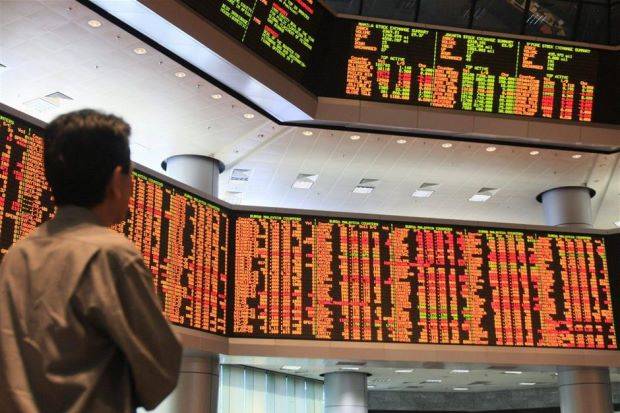NEW YORK - World stock markets ended 2015 with a whimper after sharp volatility sparked by China's slowdown, eurozone stimulus, the Greek crisis, rising US rates and a commodities rout.
"After a year that began so promisingly the markets are wrapping up 2015 in the limpest way possible, a collective sigh instead of any attempt at New Year's Eve fireworks," said Spreadex analyst Connor Campbell.
Asian equities limped across the finish line after a tumultuous 2015 that also witnessed a summer meltdown on the battered Chinese stock exchange. Later in the global day, European shares slumped and US stocks also fizzled, with a final-day sell-off pushing the S&P 500 to a modest loss for the year, marking its first annual decline since 2011.
"The good news is we did not have a bear market, but the bull market stopped," said Hugh Johnson of Hugh Johnson Advisors. "The real problem is valuation."
European and US markets had enjoyed a record-breaking run at the start of the year, boosted by the expectation and then delivery of European Central Bank's quantitative easing (QE) stimulus and the resilience of the US economy amid a global slowdown.
Investors fretted on uncertainty over the Federal Reserve's first interest rate hike in almost a decade, but shrugged when the US central bank eventually lifted borrowing costs in December. China's economic slowdown also plagued trading floors in 2015 and sent commodities reeling because the Asian giant is a top consumer of many raw materials. Oil prices collapsed on global oversupply, culminating in an 11-year low for Brent crude last week.
"There have been two distinct periods to the markets this year. The first third ... of 2015 saw the European and US markets all surge to fresh all-time highs, prompted by the promise, and delivery, of (ECB chief) Mario Draghi's long awaited quantitative easing plan," Campbell told AFP.
"Yet as the year went on, the euphoric trading atmosphere began to sour," he said, as attention shifted to unease over Greek debt, the sinking Chinese stock market and an impending US rate hike.
Over the course of the year, Frankfurt -- which was closed Thursday -- and Paris have won almost ten percent in value. London's commodities-heavy shares index was however down 5.0 percent. In light holiday trade on Thursday, the British capital's FTSE 100 finished 0.5 percent lower. The French CAC 40 ended down 0.9 percent.
In New York, the S&P 500 dropped 0.9 percent to close the year out with a 0.7 percent loss. The slowdown in China's growth, and fears about Beijing's ability to manage it, sent shudders through global markets in the summer, slicing trillions off valuations.
The Shanghai index, which had soared 150 percent in 12 months crashed more than 40 percent, with profit-taking and concerns about high valuations stoking worries. Markets were also rocked this year by Greece's financial crisis. In July, Athens accepted a three-year, 86-billion-euro EU bailout that saved it from crashing out of the eurozone.
The ECB meanwhile delivered an interest rate cut in early December and expanded stimulus measures, but the moves were not as bold as investors had hoped.
Looking ahead, China remains central to the outlook for global markets, according to VTB Capital economist Neil MacKinnon. "In spite of tentative signs that the Chinese economy might be stabilizing there are still challenges posed by very high levels of credit and debt.
On Thursday, Hong Kong stocks ended up 0.2 percent, but lost more than seven percent over the year.
Shanghai closed down 0.9 percent, drawing to a close one of the most painful years in its 25-year history but still ending it 9.4 percent higher. Tokyo and Seoul were closed. McKinnon also said that commodity prices key to market performance in 2016. "A further decline in the oil price ... could present additional problems," he said, with some analysts pegging a potential bottom at $20 a barrel.
Thursday, April 18, 2024
Global markets end 2015 with a whimper

President Zardari to address joint session of Parliament today
10:15 AM | April 18, 2024
Pakistan set to face New Zealand in first T20I match today
10:12 AM | April 18, 2024
World's largest Chinese telescope spots over 900 rotating neutron stars
10:06 AM | April 18, 2024
Rail Revival
April 17, 2024
Addressing Climate Change
April 17, 2024
Saudi Investment
April 17, 2024
Political Reconciliation
April 16, 2024
Pricing Pressures
April 16, 2024
Justice denied
April 18, 2024
AI dilemmas unveiled
April 18, 2024
Tax tangle
April 18, 2024
Workforce inequality
April 17, 2024
New partnerships
April 17, 2024
ePaper - Nawaiwaqt
Advertisement
Nawaiwaqt Group | Copyright © 2024





